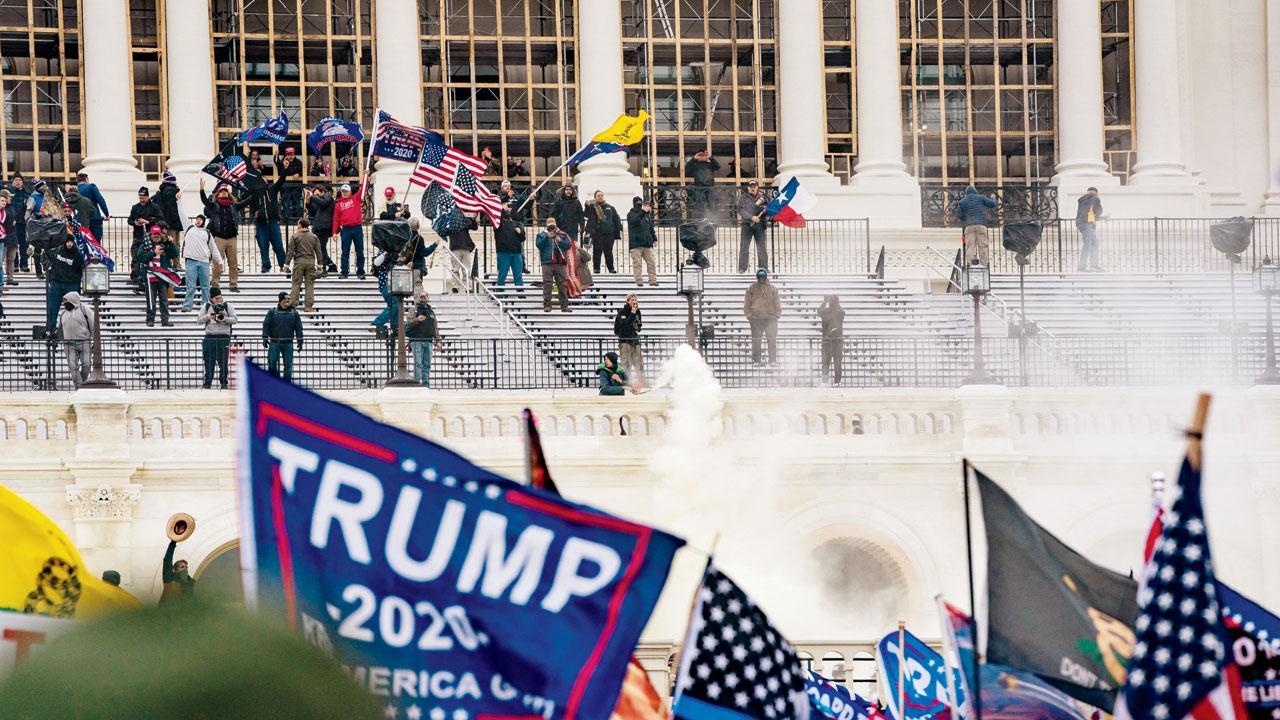Observers claim the US is broken and needs to heal. What does one say about India?

Donald Trump supporters at the US Capitol during the January 6 riot in Washington, DC. Pic/AFP
An attempted coup by a right-wing fascist masquerading as an unbiased leader was the final straw. It finally brought home to millions of Americans what so many of us outside had known for years. Donald Trump may or may not contest another election, but the damage he has caused to the very fabric of his country’s democracy will take decades to undo. He may be dismissed as a footnote in history, but his actions will be remembered for generations.
The attack by a mob of his supporters prompted passionate appeals from Democrats as well as Republicans, all calling for unity in a time of extreme dissension. It made me think of India, the way most things seem to do. Could we call ourselves a unified nation? To me, the painfully obvious answer was that we couldn’t.
A unified nation is one that believes everyone who calls it home deserves a fair chance and should have access to a few fundamental rights. The past couple of years have repeatedly shown that there are two Indias under the same sky, and which one you belong to determines how you think democracy works.
How does one fix a country anyway? By asking everyone to get along and start pulling in the same direction? By launching taxpayer-funded marketing campaigns to tell us all that better days are coming up? Healing begins with an acknowledgement that something has been broken, which is where India appears to have stalled. Everyone I know recognises that things aren’t going according to plan, but no one wants to call it out because not doing so somehow makes life more bearable.
I find it strange that we never seem to look at our country with any real objectivity. We consistently talk about how it is the best place on Earth, even as we do everything in our power to make sure our children can live abroad. Facts about the Human Development Index, malnutrition, Press Freedom Index, and human rights are routinely ignored by millions of us because these statistics don’t seem to affect us directly. We fail to look at the larger picture, where the suffering of some eventually leads to the suffering of everyone. In the bargain, we do ourselves as well as our country a disservice.
There is no easy way to fix a country because this is a process that requires a generation of people to change how they think. The United States is now a place where people on opposite sides of a debate are refusing to have a conversation, making the possibility of them finding common ground more remote than ever before. Politicians and spokespeople for various factions will have their say, but none of those words will mean anything until common men and women choose to examine their ways of thinking and evaluate what that means for the greater good.
I often try and start addressing larger problems by breaking them into constituent parts. I can’t change how a country thinks, obviously, but find that speaking to family and friends often triggers conversations with other people down the line that end up making a difference. It’s why schoolchildren across India today have taken it upon themselves to undo the damage caused by their parents when they look at issues such as air pollution.
No schoolchild I know believes in fireworks during festivals the way people of my generation did. They talk about climate change and damage to their lungs instead. This is also why young men and women increasingly stand on the frontlines of society, forcing the rest of us to have difficult conversations about things we have swept under carpets for too long.
Today’s India, like today’s America, is a place of distrust, anger, and prejudice. It is a place where a comedian can be arrested for something that hasn’t been said, while a politician can be feted despite actually saying something that deserves censure. There are more and more double standards on display, and there will come a time when those at the receiving end of them will ask the rest of us to speak up.
Ask the women of India if this is a safe country. Ask minorities if they believe their lives matter. Ask students if they feel safe on campus, and we may start to understand the disconnect between what we think our country is like, and what it really is. Do this because it is only when we call things out that we can start to fix them.
When he isn’t ranting about all things Mumbai, Lindsay Pereira can be almost sweet. He tweets @lindsaypereira. Send your feedback to mailbag@mid-day.com
The views expressed in this column are the individual’s and don’t represent those of the paper
 Subscribe today by clicking the link and stay updated with the latest news!" Click here!
Subscribe today by clicking the link and stay updated with the latest news!" Click here!









